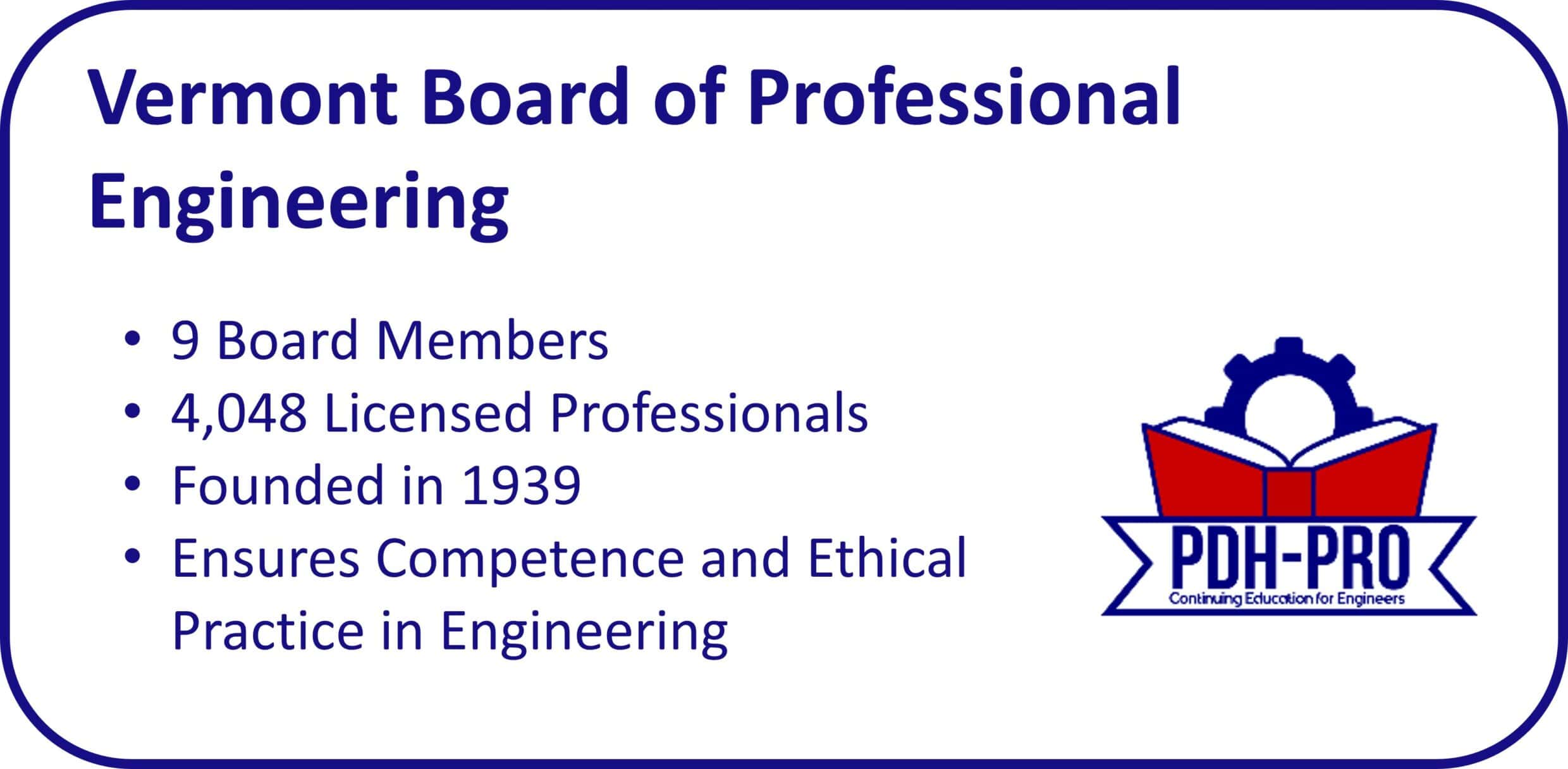CEU Requirements for Vermont Professional Engineers
Professional engineers must maintain their skills and and broaden their technical knowledge base to ensure public confidence. We are frequently asked by engineers – What are the continuing education requirement for Vermont professional engineers?
The following information carries a great deal of significance when it comes to continuing education requirements in Vermont: 30 PDHs required, (2) biennial license renewal, (3), credit earned up to one year before the renewal date can be forwarded to the next renewal cycle, (4), the course content that engineers can take include technical, ethical, and managerial subjects relevant to a licensee’s engineering field, and (5), the renewal date is July 31 of even-numbered years.
For a complete list of all license renewal requirements check out our Vermont PE renewal page.
Required PDH Credits
The license renewal period for professional engineers in Vermont is biennial. This is a two-year period in which licensees should complete 30 PDHs. The licensing board in Vermont is the Vermont Board of Professional Engineering (VBPE). The board expects that all licensees undertake technical, managerial, and ethical courses that improve, maintain, and expand their engineering skills and knowledge. It’s also worth noting that the course activities have to be relevant to one’s engineering discipline for them to qualify for PDH credits.
 It’s also imperative to highlight that VBPE does not pre-approve course providers or courses for licensees. Instead, it’s the responsibility of each engineer to determine whether a course activity meets the requirements of the board or not. Additionally, engineers in Vermont need to know that electronic renewal is accepted by the board. Record keeping after completion of continuing education courses is important for all engineers. In this respect, engineers should keep such records for a minimum of 4 years.
It’s also imperative to highlight that VBPE does not pre-approve course providers or courses for licensees. Instead, it’s the responsibility of each engineer to determine whether a course activity meets the requirements of the board or not. Additionally, engineers in Vermont need to know that electronic renewal is accepted by the board. Record keeping after completion of continuing education courses is important for all engineers. In this respect, engineers should keep such records for a minimum of 4 years.
License Renewal Dates
The license renewal date for professional engineers in Vermont is July 31 of even-numbered years. An engineer should complete 30 PDHs during the renewal period. The course activities that licensees participate in aim at maintaining, improving, and broadening the competence and knowledge of engineers in their specific fields of engineering practice. Once they are through with the courses, they should keep the records since they will need them for future reference.
Engineering Ethics and Professional Conduct
Ethical standards and professional conduct are part and parcel of engineering practice. Public safety, welfare, and health form a big part of what professional engineering is all about. This explains why it’s so important for engineers to take continuing education courses for license renewal. The state’s engineering board has to make sure that there is proof of improved skills and knowledge for an engineer to have license renewal. Essentially, the courses that licensees take should contain content that sharpens one’s ethical and professional conduct. Moreover, gaining knowledge on the state laws and regulations regarding engineering practice is important for engineers. This implies that licensees have to execute their practice within the circles of state rules and regulations. When an engineer gets equipped with the right professional content, the services produced have professionalism in them. Similarly, when licensees go through ethical content, they are able to present themselves in the highest levels of moral standard.
Records Keeping Requirements for Engineers
Keeping records is cardinal for professional engineers in Vermont. The board requires engineers to maintain records of course completion for a minimum period of 4 years. It’s these records that demonstrate proof that licensees took continuing courses and they were able to earn credits from them. Whenever the board is going through the records of course completion by engineers, it looks for the following: the continuing education course activity taken, the location, the duration, the sponsoring institution, the instructor’s name, and the PDH credits earned. These records have a big role to play in the career of professional engineers since they are requirements for license renewal.
Continuing Education Activities Accepted by the Board
For a licensee to earn PDH credits, the continuing course activities taken have to meet the criteria of the board. Despite the board not pre-approving course providers and courses, licensees have to ascertain if a course activity is in line with the requirements of the board or not. Basically, according to the board, a continuing education course has to maintain, improve, and broaden the level of expertise and knowledge that an engineer has. Also, the courses should be related to one’s engineering field. For instance, if a licensee has an electrical engineering license, the activities taken should be related to that particular engineering discipline. Examples of the continuing education activities that the board accepts:
- Ethics or administrative courses related to engineering
- Publishing books, articles, and papers
- Conventions, trainings, conferences, and seminars that have engineering content that is related to an engineer’s discipline of specialization
- Being a trainer in an engineering course or seminar for the first time
- Attending electronic PDH courses
All professional engineers in Vermont should take note that online courses are allowed by the board. On the same point, there is no limit to the number of PDHs that one can earn through online courses. For engineers who would like to take continuing education through live webinars, this is a great path to take. Undeniably, it’s an efficient way of increasing and improving engineering skills and knowledge.
Pre-Approval of Continuing Education Activities
Licensees in Vermont should know that the board does not pre-approve course providers or continuing education activities. Nevertheless, it’s the duty of all engineers to ensure that the activities they choose meet the criteria of the board.
Sources of Free Continuing Education Courses
For those who would like to enroll for free continuing education courses, there are options they can explore. For information on the sources of free continuing education courses, engineers should frequently look out for updates from online platforms. The major sources of free continuing education courses for professional engineers are: professional engineering institutions, educational organizations like universities, and websites.
Engineering Licensing Requirements
A bachelor’s degree graduate in engineering or engineering technology
- Passing the fundamentals of engineering examination
- At least 6 years working experience in a licensee’s engineering field
- Passing the Principles and Practice of Engineering test
Engineering Discipline Restrictions for Continuing Education Courses
The state of Vermont’s engineering board restricts the course activities that a licensee can take based on their particular engineering practice. This means that the course activities that engineers take have to be related to their particular engineering disciplines. For example, if one has a license to practice mechanical engineering, the courses have to be related to that specific field.
Professional engineers in Vermont have to take note of the above-mentioned guidelines for continuing education when seeking for license renewal. The courses act as a fundamental factor in improving the value of their practice, therefore they are of immense worth to them.
